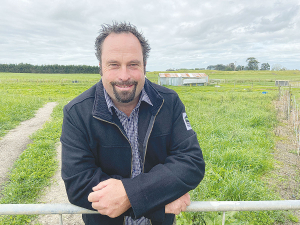Editorial: RMA reforms uproar
OPINION: The euphoria over the Government’s two new bills to replace the broken Resource Management Act is over.
 Richard McIntyre says suddenly finding an alternative to feed isn’t that easy in certain parts of the country.
Richard McIntyre says suddenly finding an alternative to feed isn’t that easy in certain parts of the country.
If there is a maize grain shortage next season, farmers will have to look for an alternative and that may not be easy.
That’s the view of Federated Farmers dairy chair and Horowhenua farmer, Richard McIntyre. He was responding to fears about the uncertainty of having sufficient maize grain grown and available in the North Island in 2025.
McIntyre told Dairy News that right now he’s feeding out maize grain to his cows, which he normally does in the winter and spring.
“Famers rely on having a consistent and regular supply of supplementary feed and if they suddenly don’t have it, they must find an alternative which is not that easy in certain parts of the country. So, this is certainly a big issue for dairy farmers and has consequences including cost implication,” he says.
Fears of a shortage of maize grain stems from the fact that most of it is grown in the North Island and must be dried to a moisture level of around 14% which has to be done at large drying facilities off-farm. The crux of the matter is that gas is used for drying the grain and there is uncertainty about whether there will be gas available and if there is – how much it will cost.
So serious is the situation that the head of Federated Farmers arable group, David Birkett, has already called a meeting of all the interested parties – farmers, seed companies, grain merchants and rural contractors together to discuss what to do next. Because of the uncertainty, now seed companies are holding off giving contracts to farmers to grow grain maize and time is running out for growers to make plans for 2025.
“At this stage no-one knows what the position will be next year and that is creating huge uncertainty for potential maize grain growers,” he says.
In the North Island, maize grain is usually harvested in April, May and June and hence is damp when harvested. Normally the companies that put out contracts for farmers to grow the grain know in advance the cost of drying the grain and include that in the contract price they offer prior to planting. But few if any contracts have been offered so far.
Birkett says given that the past season for maize was something of a disaster, most are apprehensive about what might happen in 2025. He says it’s highly unlikely a farmer will grow a maize grain crop without a contract and he’s predicting maize grain supply will be down next year. But he adds the maize silage crop will remain about the same as it.
“We have also briefed central government on the issue, but have had little response and it would appear that they taking the view that this is a case of the market doing what it does,” he says.
Back on the land, McIntyre and other dairy farmers are thinking about alternatives to maize grain. He says maize grain is a carbohydrate and the other alternatives could be wheat, barley or tapioca. McIntyre also notes that others such as pig and poultry farmers could find themselves in a similar situation.
Finally, Birkett says the issue is a serious one with implications right across the primary sector. He says if less maize is planted it has implications for rural contractors among others.
“This is not just about farming – it’s something of national importance that needs to be sorted out,” he says.
He, like other farmers, is hopeful that a resolution to the problem can be found quickly.
Not everyone is affected by the gas price crisis. Farmers who grow maize silage are not affected. Roughly 50% of the maize grown in NZ is for grain and the other half for maize silage.
Global trade has been thrown into another bout of uncertainty following the overnight ruling by US Supreme Court, striking down President Donald Trump's decision to impose additional tariffs on trading partners.
Controls on the movement of fruit and vegetables in the Auckland suburb of Mt Roskill have been lifted.
Fonterra farmer shareholders and unit holders are in line for another payment in April.
Farmers are being encouraged to take a closer look at the refrigerants running inside their on-farm systems, as international and domestic pressure continues to build on high global warming potential (GWP) 400-series refrigerants.
As expected, Fonterra has lifted its 2025-26 forecast farmgate milk price mid-point to $9.50/kgMS.
Bovonic says a return on investment study has found its automated mastitis detection technology, QuadSense, is delivering financial, labour, and animal-health benefits on New Zealand dairy farms worth an estimated $29,547 per season.
OPINION: Staying with politics, with less than nine months to go before the general elections, there’s confusion in the Labour…
OPINION: Winston Peters' tirade against the free trade deal stitched with India may not be all political posturing by the…